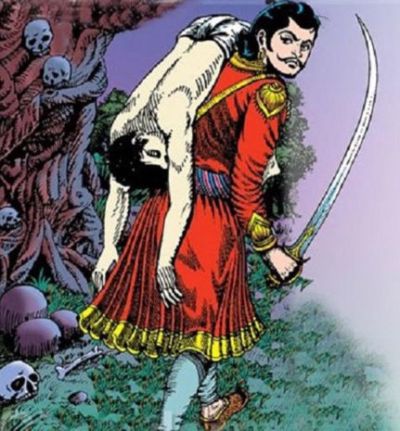Read the previous part here…
He then went to meet the king, and offered him all his wealth, and more, if only he would pardon the thief.
But the king did not agree. “Not for all your wealth, not for all the wealth in the world”, he thundered.
“This thief plundered my kingdom, and I caught him with my own hands, at the risk of my own life. And so, he shall die for his sins, first thing tomorrow!”

ततः पितर्य् उपायाते विमुखे सा वणिक्सुता ।
अनुमर्तुं कृतस्नाना वार्यमाणापि बन्धुभिः ॥ १२,२१.४० ॥
आरुह्य शिबिकां तस्य दस्योर् वध्यभुवं ययौ ।
अन्वीयमाना रुदता पित्रा मात्रा जनेन च ॥ १२,२१.४१ ॥
तावच् च वधकैः सो ऽत्र चौरः शूले ऽधिरोपितः ।
तां ददर्श गलत्प्राणस् तथा सज्ञातिम् आगताम् ॥ १२,२१.४२ ॥
जनाच् छ्रुत्वा च वृत्तान्तम् अश्रु मुक्त्वा क्षणं ततः ।
हसन् स चौरः किम् अपि प्राणाञ् शूलगतो जहौ ॥ १२,२१.४३ ॥
ततो ऽवतारितं शूलात् सा तच्चौरकलेवरम् ।
आदाय चारुरोहात्र चितां साध्वी वणिक्सुता ॥ १२,२१.४४ ॥
Ratnadatta returned home disappointed, and Ratnavatī made up her mind to die with the thief the following morning.
All her relatives tried to dissuade her, but Ratnavatī refused to listen. The next morning, she had a bath, prayed to Śiva, and then got into the doli (palanquin) and went to the town square, where the thief was to be executed. She was followed by her father and relatives, all of them weeping softly as they walked behind her.
When they reached there, the thief had already been impaled by the executioners, and had been left to die slowly.
As Ratnavatī approached, the thief heard the townsfolk speaking about her and how she had fallen in love with him and decided to follow him even in death…
The thief then wept for a few moments, laughed once, and then died.
A tearful Ratnavatī had his body taken down from the stake, and laid on the cremation pyre, and she prepared to lie down on it, next to him.
तत् क्षणं च श्मशाने ऽत्र भैरवः कृतसंनिधिः ।
अदृश्यो भगवान् एवं ताम् उवाचान्तरिक्षतः ॥ १२,२१.४५ ॥
अस्मिन् स्वयंवरपताव् एवं भक्त्या तवानया ।
तुष्टो ऽस्मि तद् वरं मत्तः प्रार्थयस्व पतिव्रते ॥ १२,२१.४६ ॥
तच् छ्रुत्वैव वरं देवाद् एवं वव्रे प्रणम्य सा ।
नाथ पुत्रशतं भूयाद् अपुत्रस्यापि मत्पितुः ॥ १२,२१.४७ ॥
येनानन्यसुतो नैषः प्राणाञ् जह्यान् मया विना ।
इति प्रोक्तवतीम् एनां साध्वीं देवो ऽब्रवीत् पुनः ॥ १२,२१.४८ ॥
पितुः पुत्रशतं ते ऽस्तु वरम् अन्यं वृणीष्व च ।
त्वादृशी दृढसत्त्वा हि नैतावन्मात्रम् अर्हति ॥ १२,२१.४९ ॥
तद् आकर्ण्याथ सावादीत् प्रसन्नो मयि चेत् प्रभुः ।
तज् जीवत्व् एष भर्ता मे धार्मिकश् च सदास्त्व् इति ॥ १२,२१.५० ॥
At that very moment, Bhairavā, the fierce manifestation of Śiva, who is always present in cremation grounds, spoke from the skies…
“O Ratnavatī! I am very pleased with your intense devotion to the man that you chose to be your husband. Ask me a varadāna !”
*Varadāna – boon
When Ratnavatī heard his voice, she folded her hands and said…
“O revered Bhairavā! Please grant my dear father a hundred sons, because I am his only child and he will die if I am there no more…”
The voice from the skies replied…
“Tathāstu! O Ratnavatī, your father will have a hundred sons. Ask me another varadāna, for you did not ask anything for your own self!”
Ratnavatī folded her hands again, and said, tearfully…
“O revered one! If you are truly pleased with me, then let this man, who I have already considered as my husband, rise up and be alive, and from now on, live a life of noble character!”
The voice from the skies replied…
to be continued…
